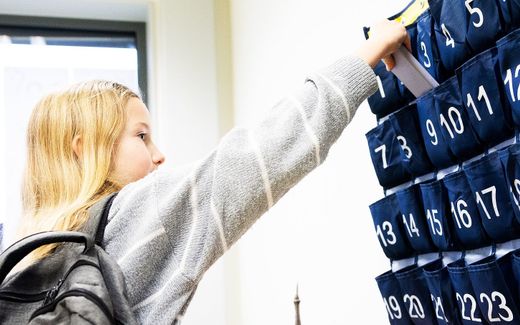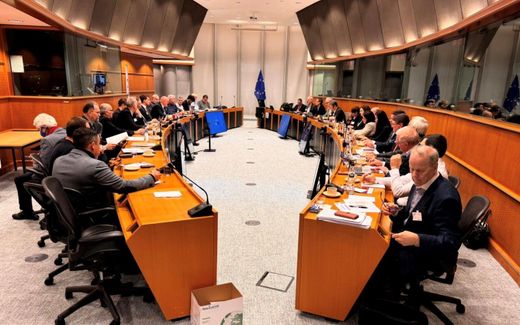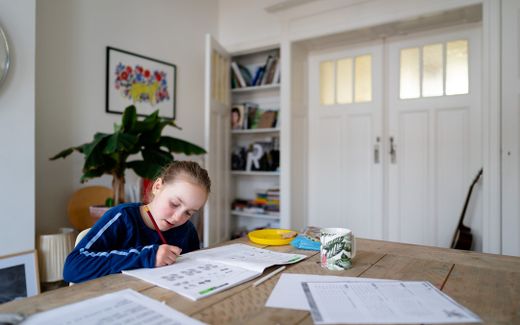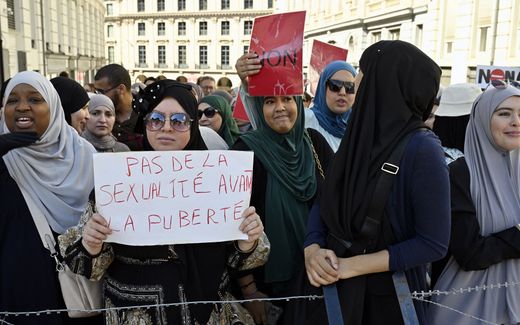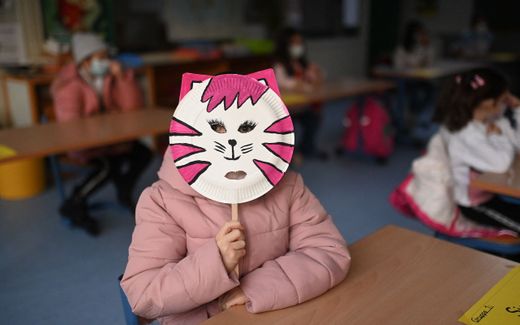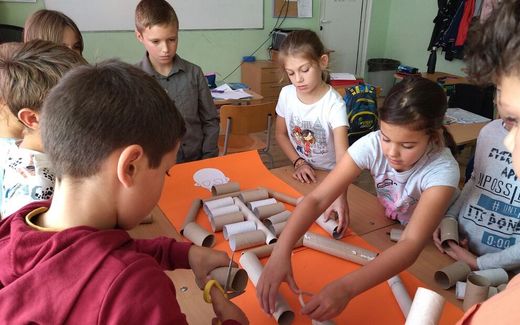How the Belgian Protestant schools try to bring the Gospel back in the class
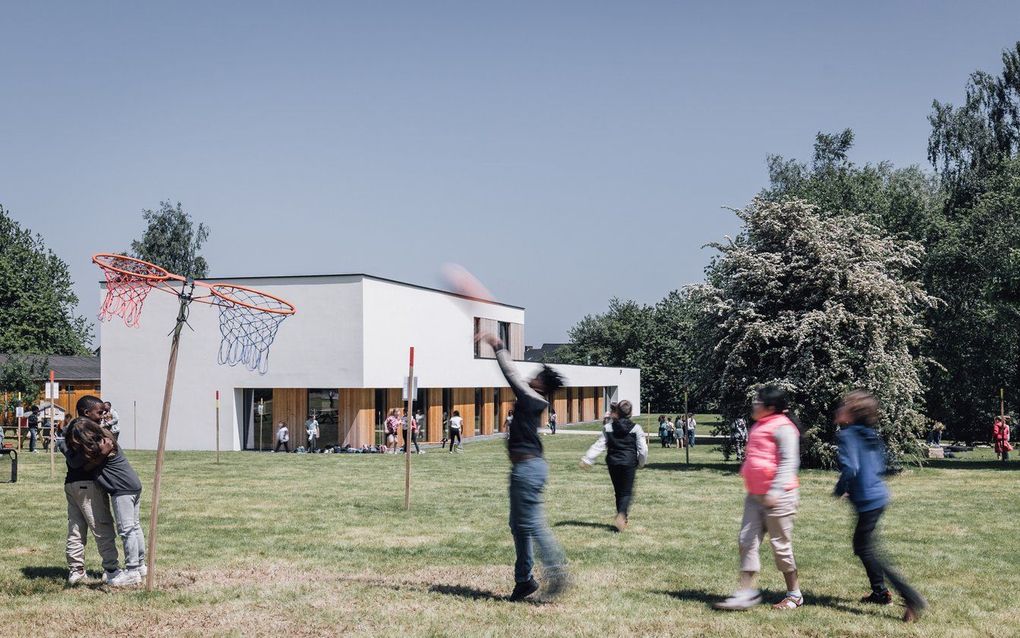
Ecole Les Perles in Belgium. Photo École Les Perles
Western Europe
Churches think that they transmit values. Of course, they do. But churches forget that the stories for life are much stronger educated in a school. That is what Frédéric Gérard sees in Belgium where he is connected to a network of Protestant schools.
Receive CNE's weekly newsletter? Feel free to sign up here.
Gérard is director of the Protestant primary school (nursery and primary levels) “Les Perles” in Charleroi. He is also part of the RESPECT network, which brings together the steering committees of Protestant schools in French-speaking Belgium. I had the privilege of conversing with Gérard through a videoconference recently.

Belgium is a country with a Roman Catholic background. However, in recent decades, several Protestant schools have emerged. How can this be?
“The Christian school movement in French-speaking Belgium followed the pioneering Christian school project launched in Alsace, France, by the Christian philosopher and theologian Luc Bussière. He understood the importance of putting the Gospel back at the centre of schools. Without these values, the entire human dimension is lost. This project inspired several Belgians to establish Christian schools in Belgium.”
In 1996, the first two French-speaking Belgian Protestant schools were born: The first one in the Brussels region: “Les Tournesols” in Anderlecht. This school has now also a middle school. The other school is in the western region of Charleroi: “École de l’Alliance” (the alliance school) in Monceau-sur-Sambre.
Ten years later, “L’école des Cèdres” (the cedars school) was born in Wasmes, west of Mons. In 2007, it was the turn of our “École Les Perles” (the pearls school) in Marcinelle, in the southern region of Charleroi, and the following year, that of “l’École de l’Arche” (the arch school) in Mouscron. The latest is “l’École les Papillons” (the butterflies school) in Manage, near La Louvière, which opened in 2020.
Frédéric Gérard
Frédéric Gérard was born into a Christian family in Brussels fifty years ago. He attended church in the capital for 25 years before moving to Charleroi, his wife’s hometown.
A young primary school teacher graduate in 1997, he was recruited by a new Protestant school called “Les Tournesols” in Anderlecht. Thanks to the teachings taught by the Frenchman Luc Bussière, he understood the value of schools based on Christian values.
In 2007, he formed a team with his wife, a maths teacher, to set up a new Protestant school near Charleroi called “Les Perles”, where their children, aged 4 and 2 respectively, were among the first students. Today, this free Protestant primary school (nursery and primary) has 200 students.
His daughter completed her studies in communication and public relations in June 2024. His son completed his first year of civil engineering at the University of Charleroi. They are committed to their faith and are one of the proofs that these schools are bearing fruit!
Frédéric Gérard is also part of a committee bringing together the steering committees of the five French-speaking Christian schools in Belgium, called RESPECT (French acronym for “Rassemblement des Établissements Scolaires Protestants Évangéliques - Comité de Travail”, i.e. Gathering of Evangelical-Protestant School Establishments – Working Committee).
Frédéric Gérard says that “unfortunately” l’Arche had to close its doors a few years ago. Another school project that had started in Waterloo, south of Brussels, was short-lived due to a lack of students and financial resources.
To date, there are five Christian schools in French-speaking Belgium: Four in the province of Hainaut and one in Brussels. This also means that four of the five French-speaking Belgian provinces (Liège, Namur, Walloon Brabant and Luxembourg) do not have a Christian school. There are a few projects in sight, but nothing concrete so far.”
What was the reaction of the authorities when Protestant schools began to emerge?
“Initially, we were all afraid of being seen as outcasts. Despite everything, we have never had any problems with the authorities. There is a legal framework in Belgium that allows us to do what we do. It is true that we could represent competition for the public school networks, but we are nevertheless sometimes supported by the authorities. They see that we do serious work. We can say that we have proven ourselves.”
Do you receive state supply?
“Yes. This is the result of what is called “the school wars” in Belgium (see below). At the time, the Roman Catholic Church fiercely opposed the desire to secularise the Belgian society, that is to say, to impose a supposedly neutral education on the entire population.
The Catholic church won this battle and was able to create its network of state-subsidised schools throughout the country. Since the Roman Catholic Church could not be privileged at the expense of other recognised denominations, Protestants could also create their own schools and receive subsidies. This is still the case today.”
School wars
The issue of education has been at the centre of debates practically since Belgium’s birth in 1831. Although Article 24 of the current Constitution states that education must be free, the country has experienced several attempts to impose a single education system controlled by the state. These attempts resulted in two “school wars”.
The first school war began in 1879 after the adoption of a law which became known as “la loi de malheur” (the law of woe). The government (composed entirely of Freemasons) sought to eliminate the role of the Roman Catholic religion in education. The Catholics resisted. After years of battles that even involved Pope Leo XIII, in 1884, the mainly Roman Catholic new government repealed the law. The new law prevented the state from having a monopoly on education and allowed the development of the so-called “free” education network, largely composed of Catholic education.
The second school war lasted a decade, from 1950 to 1959. At the time, secondary education (ages 12 to 18) was spreading rapidly, but it was only the official state network that received subsidies. The reaction of the Catholics led to the adoption of a law allowing the financing of the denominational network. This time, the anti-Christian movements (liberals and socialists) reacted against it. The war ended with the adoption of the “school pact,” which accepted the financing of both networks. The fact that Protestant schools are today subsidised by the state is the result of these two major battles led by the Roman Catholic Church of Belgium.
Without any conditions?
“Not quite. We still have to reach the set objective of minimum knowledge imposed, in particular by the Basic Studies Certificate at age 12, but the method is free. We must also have a sufficient number of students, prove that the school is of interest to society, and therefore show annual progress during the first five years.
We realise that we have a great advantage over other French-speaking European nations, such as France or Switzerland. In these countries, funds must come from the private sector. In our country, parents do not have to pay anything for schooling. Only extra-curricular services are charged.”
So, you have never encountered any conflict?
“With the public authorities, not really. We are not necessarily pleasing to them, but since we are a small minority, we do not represent a real threat. We must nevertheless be careful that the state, via certain lobbies, doesn’t force us to teach anti-biblical values, as is sometimes the case in certain public schools.
For the rest, we respect everything that is requested by the government to all subsidised schools regardless of the network, confessional or not.”
And how is your relationship with local churches?
“It is good overall, but, unfortunately, we have also encountered conflicts at this level. In some cases, a local church has sometimes sought to interfere in the management of the school, which has caused tensions. This happened, for example, when a school started to grow on the site of a church, which gave the false idea that the school should be under its control. This is not the model we advocate. If we can unite on values, each structure has its own missions and skills.”
Have you nevertheless been supported by churches?
“With regard to our school, without a doubt. The support of the churches remains crucial. We were able to start without a subsidy in 2007, thanks to donations from a church in Couillet (Charleroi region), which provided us with the premises to accommodate our first seven students. The following year, another church was added. In two years, we had already reached 50 students.
Today, we have the support of all kinds of churches: Italian Pentecostals, Reformed, traditional free evangelicals and Romanian migrant churches. So, I can’t complain.
As for the other schools, I know that they have also benefited from the support of some local churches. We are there for their children and for all those who trust us. When you teach love for your neighbour, it ends up bearing fruit, and our network expands.
However, we have to admit that the glass is only half full. We could have much more support. In the region of Charleroi alone, there are about 70 Protestant churches or communities. Some have never contacted us despite our eighteen years of existence. For some pastors or leaders, Christian education does not seem to be a priority. I believe that many Christians do not realise that school is the place where the child receives the messages that will shape his life.
If we give our children to schools that don’t recognise Jesus Christ, we should not be surprised if they do not live a Christian life as adults. So, I must say that, unfortunately, the churches that support us are still too marginal.”
What are the current challenges?
“We lack Christian teachers. The vision of Christian schools is not yet widespread enough. The interest in a school based on Christian values is not fundamental in people’s minds. In addition, the teaching profession is unpopular in Belgium. According to statistics, 35 per cent of new teachers leave their jobs during the first five years.
However, we also have nice surprises. Many non-Christian parents want to entrust their children to us because they see that we have other values than those that dominate today’s world. Also, many Catholics are realising that their network is becoming less and less Christian, so they are turning to us. A few years ago, we hired a Catholic teacher. One day, she told us that the way we pray during our weekly prayer meetings has allowed her to grow closer to God.”
Education in French-speaking Belgium today
The management of education in Belgium has been decentralised since the 1980s. In the case of French-speaking Belgium, there are no fewer than five networks: three official networks (managed by the state) and two independent networks. The three official networks are the official organised network, managed by the Wallonia-Brussels Federation, the official network subsidised by the municipalities, and the official network subsidised by the provinces. The two independent networks are the free confessional network (mainly of Roman Catholic Education) and the free independent network (Felsi). Among the plans of the new centre-right Walloon government is the merger of the three official networks. This should have no influence on the Protestant Christian schools.
Related Articles


